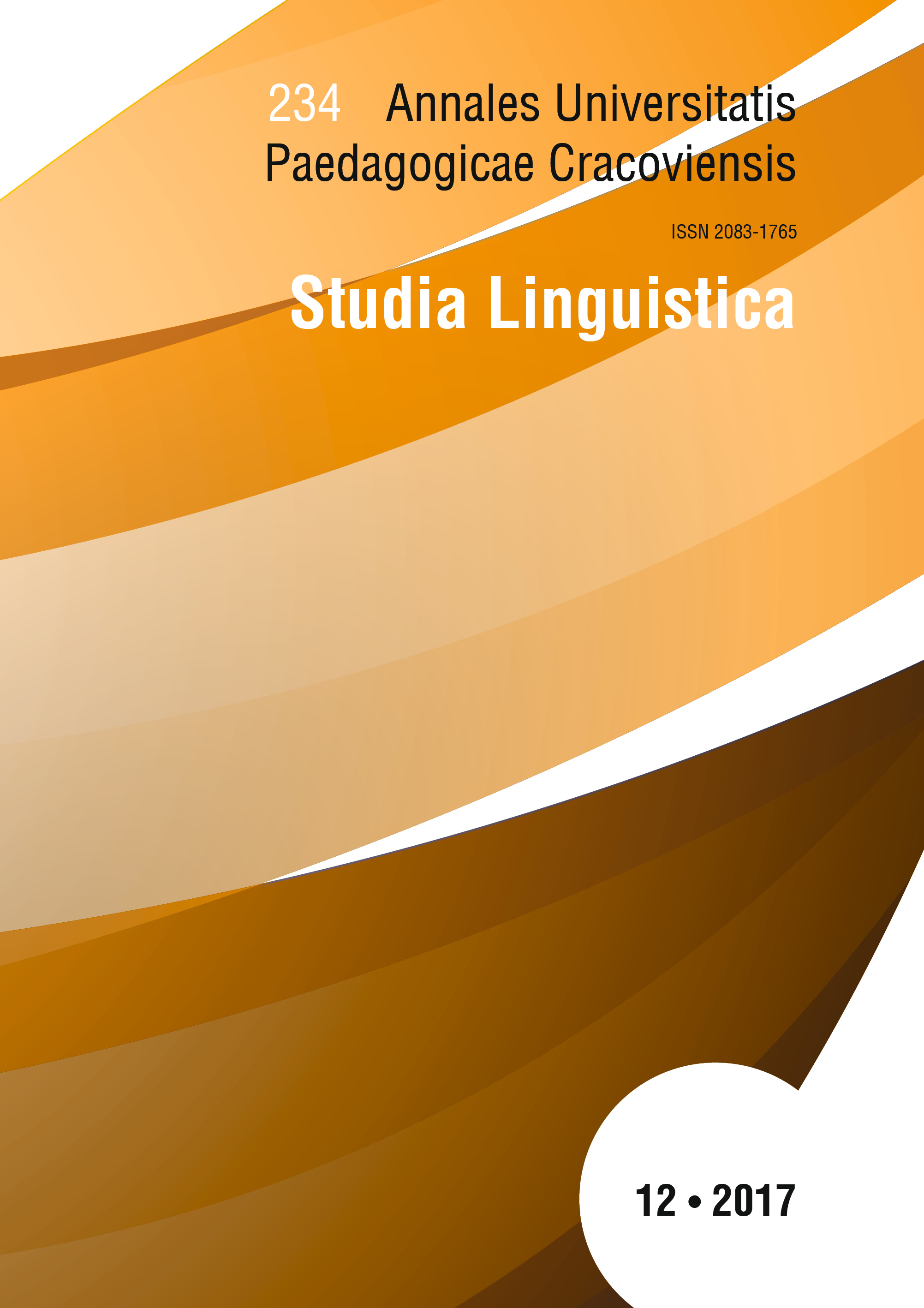Pisarz i jego język. Przypadek Iva Andricia
Main Article Content
Abstrakt
A complex biography of Ivo Andrić (1892-1975) was shaped in a wide net of identity references: ethnocultural, religious, political, and linguistic. He was born to a Croatian Catholic family in Bosnia, he was a convinced supporter of Yugoslavism and a writer of the language defined as Croato-Serbian / Serbo-Croatian diasystem. In the period of his links with the cultural environment of Zagreb (1912-1919), he was writing according to the Croatian standard, later basically, in Serbian, but using environmental and stylistic diversity of the diasystem in order to stress its cognitive and artistic potential. Currently, when four national language standards are developing on the basis of the diasystem: Serbian, Croatian, Bosnian and Montenegrin, reading Andrić in accordance with post-Yugoslav linguistic ideas, that is with the awareness and conviction about the „break-up” of the Serbo-Croatian language, would necessarily lead to an absurd conclusion that the writer created his works using the content of various languages. Literary heritage of the great writer of Serbo-Croatian language, which remains a sociocultural fact, has been used not only by Serbian culture and language, but also by global culture - thanks to translations of the works of this Nobel laureate into numerous world languages.
Downloads
Article Details
Autor, zgłaszając tekst do redakcji czasopisma „Annales Universitatis Paedagogicae Cracoviensis. Studia Linguistica”, zaświadcza, iż jest on rezultatem wyłącznie jego własnej twórczości, że treść artykułu nie była dotychczas publikowana oraz że utwór nie narusza w żadnym stopniu praw autorskich ani praw pokrewnych innych osób, jak również innych praw osób trzecich, a także, że niczyje prawa do utworu (lub jego jakiejkolwiek części) nie zostały pominięte. Po podpisaniu umowy prawa majątkowe do opublikowanych materiałów zostają przeniesione na Wydawnictwo Naukowe Uniwersytetu Komisji Edukacji Narodowej w Krakowie.
Rocznik „Annales Universitatis Paedagogicae Cracoviensis. Studia Linguistica” to czasopismo o otwartym dostępie, a cała jego zawartość jest udostępniana bezpłatnie dla użytkowników i instytucji na zasadach licencji Creative Commons CC-BY-NC-ND 4.0 (uznanie autorstwa, użycie niekomercyjne, bez utworów zależnych). Na podstawie tej licencji autorzy zgadzają się, że ich prace mogą być zgodnie z prawem ponownie wykorzystywane do jakichkolwiek celów, za wyjątkiem celów komercyjnych, bez konieczności uzyskania uprzedniej zgody ze strony autora lub wydawcy. Każdy może prace te czytać, pobierać, kopiować, drukować, rozpowszechniać oraz przetwarzać, pod warunkiem poprawnego oznaczenia autorstwa oraz oryginalnego miejsca publikacji. Publikowanych tekstów nie można wykorzystywać do tworzenia utworów zależnych (np. do tłumaczenia ich i publikowania w innym języku bez zgody wydawcy). Jest to zgodne z definicją otwartego dostępu BOAI (Budapest Open Access Initiative) „Studia Linguistica”nie pobiera opłat za składanie artykułów ani ich przetwarzanie.
Autor, przesyłając artykuł do redakcji „Studia Linguistica”, bezwględnie zgadza się z poniższymi punktami:
-
Oświadczam, że jestem Autorem lub Współautorem nadesłanego tekstu. Przesłany tekst nie był nigdzie publikowany, jest całkowicie oryginalny i nie narusza w żadnym stopniu praw autorskich ani praw pokrewnych innych osób, jak również innych praw osób trzecich, a także, że niczyje prawa do utwory nie zostały pominięte.
-
Oświadczam, że nadesłany tekst nie został złożony do recenzji lub/i publikacji w innym czasopiśmie.
-
Przyjmuję do wiadomości, że Autor ponosi pełną odpowiedzialność za każdy przypadek plagiatu, niezależnie od tego, czy został on wykryty podczas procesu recenzji, czy po publikacji w „Studia Linguistica”.
-
Oświadczam, że ponoszę pełną odpowiedzialność finansową i prawną za wszelkie roszczenia związane z utworem.
-
Potwierdzam uznanie wszystkich źródeł danych wykorzystanych i cytowanych w badaniach.
-
Potwierdzam, że artykuł został wykonany z należytą starannością zgodnie ze standardami edytorskimi „Studia Linguistica”.
Bibliografia
Cichońska M., 1992, Czy język może się rozpadać?, [w:] Rozpad mitu i języka?, red. B. Czapik, Katowice, s. 177–183.
Google Scholar
Darasz Z., 2014, Njegoševi krugovi identiteta, [w:] Njegoš u svome vremenu i danas, red. Z. Bojović et al., „Naučni sastanak slavista u Vukove dane”, t. 43/2, Beograd, s. 13–21.
Google Scholar
Gołąb Z., 1958, Język czterech narodów, „Poznaj Świat” VI, nr 6, s. 13–16.
Google Scholar
Gołąb Z., Heinz A., Polański K., 1968, Słownik terminologii językoznawczej, Warszawa.
Google Scholar
Hofman-Pianka A., 2000, Socjolingwistyczne aspekty współczesnego języka bośniackiego, Kraków.
Google Scholar
Jaroszewicz H., 2006, Jugosłowiańskie spory o status języka serbsko-chorwackiego w latach 1901–1991, Wrocław.
Google Scholar
Morawiec E., 1975, Mosty, „Życie Literackie” XXV, nr 30, s. 1, 10.
Google Scholar
Nowak-Bajcar S., 2013, Helena, kobieta, której nie ma i która jest. Krakowska biografia Ivo Andricia, Kraków.
Google Scholar
Pianka W., 1992, Nie ma rozpadu języka!, [w:] Rozpad mitu i języka?, red. B. Czapik, Katowice, s. 184–193.
Google Scholar
Skrzeszewska M., 2015, „Mješavinu uspite” lub „mešavinu sipajte” – czy tłumaczenia i oddzielne instrukcje konsumenckie na obszarze byłego języka serbsko-chorwackiego są potrzebne? Analiza wybranych przykładów, „Socjolingwistyka” XXIX, s. 337–354. Wierzbicki J., 1965, Ivo Andrić, Warszawa.
Google Scholar
Wybranowski D., 2014, Geneza i uwarunkowania procesu przekształcenia na przełomie lat 60. i 70. XX wieku wspólnoty muzułmanów z Bośni w Muzułmanów, „konstytucyjny naród” Jugosławii, „Przegląd Zachodni” LXX, nr 4, s. 73–99.
Google Scholar
Netografia
Google Scholar
https://www.jergovic.com/sumnjivo-lice/je-li-ikad-postojao-jezik-kojim-je-pisao-ivo-andric/ (dostęp: sierpień 2017).
Google Scholar
https://www.rastko.rs/rastko-pl/umetnost/knjizevnost/studije/mzivancevic-andric_l. php (dostęp: sierpień 2017).
Google Scholar
https://pl.wikipedia.org/wiki/Laureaci_Nagrody_Nobla_w_dziedzinie_literatury (do- stęp: sierpień 2017).
Google Scholar

